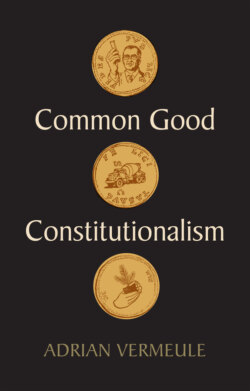Читать книгу Common Good Constitutionalism - Adrian Vermeule - Страница 13
Determination – Of the Constitution and Within the Constitution
ОглавлениеIn the classical tradition, regnative prudence is closely linked to the concept of determination – the process of giving content to a general principle drawn from a higher source of law, making it concrete in application to particular local circumstances or problems. I will explain this crucial concept in detail in Chapter 1. Briefly, the need for determination arises when principles of justice are general and thus do not specifically dictate particular legal rules, or when those principles seem to conflict and must be mutually accommodated or balanced. Those general principles must be given further determinate content by positive civil lawmaking. There are typically multiple ways to determine the principles while remaining within the boundaries of the basic charge to act to promote the common good – the basis of public authority. By analogy, an architect who is given a general commission to build a hospital for a city possesses a kind of structured discretion. The purpose or end of the commission shapes and constrains the architect’s choices while not fully determining them; a good hospital may take a number of forms, although there are some forms it cannot take.
So too at the level of the whole constitutional order. The common good in its capacity as the fundamental end of temporal government shapes and constrains, but does not fully determine, the nature of institutions and the allocation of lawmaking authority between and among them in any given polity. Such matters are left for specification that gives concrete content to the operative, small-c constitution (which is not necessarily the same as the formal written Constitution even in polities that have the latter). Call this determination of the constitution.
This agnosticism at the level of institutions, in turn, has two aspects: agnosticism about institutional design, and about the allocation among institutions of authority to interpret the constitutional scheme. Parliamentary and presidential systems, constitutional monarchies and republics, all these and more can in principle be ordered to the common good. Likewise, the common good does not, by itself, entail any particular scheme of (for example) judicial review of constitutional questions, or even any such scheme at all. The common good takes no stand, a priori, on the well-known debate over political constitutionalism versus legal constitutionalism,21 so long as the polity is ordered to the good of the community through rational principles of legality.22
This broad agnosticism does not mean that there are no boundaries whatsoever; it just means that the boundaries are set by the nature of law itself, as an ordination of reason to the common good. Certain institutional arrangements, mostly science-fictional and horrific, will be ruled out even if no one set of arrangements is uniquely specified. But they will be ruled out because they are arbitrary and unreasoned, and thus do not participate in the nature of law, not because the common good directly commands particular institutional forms. Likewise, strictly aggregative-utilitarian arrangements will be ruled out by the non-aggregative nature of the common good, an example being a substantial class of invisible-hand arrangements justified as an indirect way of maximizing aggregate utility.23 But the ruling out of certain arrangements leaves a wide scope for choice that adapts institutional forms to local circumstances.
So far I have been talking about determination of the constitution. At another level, there is also determination within or under the constitution. Particular sets of institutions (among which authority has been allocated) give further specification to general constitutional principles of the common good, such as principles of solidarity and subsidiarity and others to be discussed here. Indeed, the process of determination is iterative and continues to ever-more detailed levels, as we will see. The legislature and executive, for example, may agree on a general statute giving some specification to a general legal principle, and in turn delegate to administrative agencies the authority to determine the general provisions of the statute. The agency may do so by a binding regulation, which may then require further interpretation, and so on.
